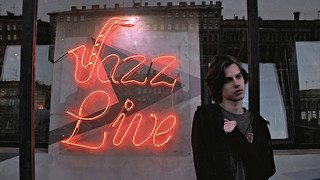Film: Godzilla
Alex Izza says Godzilla is big and not so bad really…

When Hollywood makes films on giant creatures that dwarf skyscrapers and raze cities to the ground, you don’t expect to be blown away by nuanced plot and character development. Largely, Godzilla fits this requirement perfectly. It is a film big on spectacle and small on subtlety. The plot rarely innovates, presenting the familiar image from popular culture of Godzilla punishing humans for their treatment of the planet – destroying several American cities in the process.
Yet it is the film’s beginning that distinguishes it from just another re-run of the infamous 1954 film. Director Gareth Edwards manages to immerse the film in conspiracy theories throughout history, a fantastic overlay of hints of Godzilla with faded newspaper articles from the early 20th century creates the promise of a deeper take on the Japanese myth. Edwards even proceeds to link it into the post-WW2 Pacific nuclear bomb tests, with their well-known secrecy brilliantly raising (certainly in the back of my head) a flicker of doubt about their purpose – surely this monster couldn’t be real? There are even nods to the heritage of the original Godzilla film, with 1950s style computers in a scene from the 1990s, a pleasant break from the generic look of recent summer blockbusters like Pacific Rim.
The acting, however, majorly lets down the opening’s promise. Aaron Taylor-Johnson and Elizabeth Olsen give really forgettable performances; their stilted delivery is outshone by the earth-shattering cry of Godzilla in full flow. There are exceptions. Fresh from the tidal wave of Breaking Bad’s success, Bryan Cranston is easily the stand-out role as Joe Brody. He delivers a believable and emotional presence in the film, with his moral dilemma between exposing the city to radiation and saving his wife in a truly heart-rending piece of cinema; a rare moment in the disaster film genre. Ken Watanabe is given a limited role, but his character Dr Serizawa provides a haunting way of developing the Godzilla myth.
It is at this point I will provide a warning: any scientifically-minded person hoping to find any shred of believability in Godzilla will be sorely disappointed. I am a Historian, but even I left this film reeling from the ridiculous plot-holes left by what Godzilla calls ‘science’. One particular moment revolved around nuclear explosions and a convenient lack of fallout – a real blow for the audience’s investment in plot.
Thematically, Edwards tries desperately to explore deeper themes beyond ‘there’s a huge monster let’s kill it.’ The role of Godzilla as the 'ancient alpha-predator' seemed almost to provide a metaphor for 21st century ‘environmentalism’, and such nods to this unappreciated issue in mainstream sci-fi proved encouraging. Beyond this, the audience is bombarded with images of the US military, both in the terrible power of their nuclear weaponry and the overdone images of the hardy US marine defending American shores from alien attack. Mainly, this levelling of American cities reinforced my growing belief that if giant monsters ever do ravage the Earth, I will be safe in the UK.
When the actors stop trying to ‘act’ and the film returns to spectacle, Edwards really hits his stride. A scene of San Francisco getting destroyed by gigantic creatures has some of the best cinematography I have seen in a long time. Godzilla’s CGI body is horrifically visceral, a ringing testament to how far visual effects has moved on in the last 60 years. The city itself is a mess of swirling clouds, felled skyscrapers and the terrible frailty of the humans caught up in the chaos. It shows how the spectacle of a summer blockbuster should be done.
Overall, I wish Edwards had either committed to depth or pushed for spectacle. By giving nods to environmentalism and the danger of nuclear technology, combined with the standard fare of humans versus monsters, he creates a film that fails to deliver either successfully. What it is, however, is gloriously unbelievable escapism. Whether you’re a NatSci drowning in revising geological formations, or a Historian sick of the Reformation, then a two-hour Godzilla break might help to keep you sane in exam term.
 News / Cambridge scholarship recipient trapped in Gaza21 July 2025
News / Cambridge scholarship recipient trapped in Gaza21 July 2025 News / Chancellorship candidates express concern about conduct of election 19 July 2025
News / Chancellorship candidates express concern about conduct of election 19 July 2025 News / News in Brief: Chaucer, coffee-houses, and challenging degrees20 July 2025
News / News in Brief: Chaucer, coffee-houses, and challenging degrees20 July 2025 News / Trinity exam burglar jailed for 11 months18 July 2025
News / Trinity exam burglar jailed for 11 months18 July 2025 News / Write for Varsity this Michaelmas13 July 2025
News / Write for Varsity this Michaelmas13 July 2025







